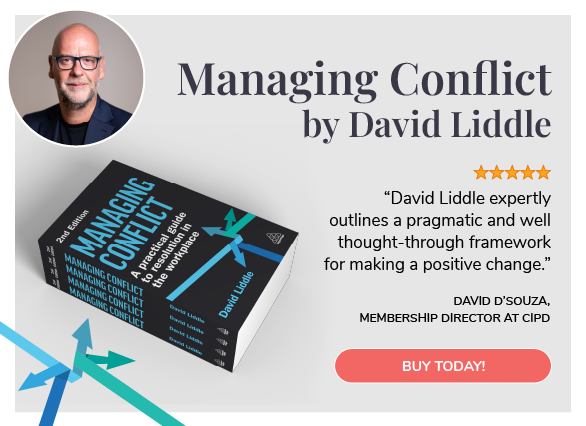
Share article:
Tags:
Three part guide to dispute resolution
Part one: Conflict at work – threat or opportunity?
I bet you’re thinking, isn’t it both: a threat and an opportunity? Of course, you would be right. So why is that we have become so bad at resolving disputes? Why is it that our managers and leaders find conflict so hard to handle? Why is it that so many employees are damaged by feuds and quarrels that should have been nipped in the bud but have instead escalated to a level that no one wanted and no one benefits from?
In this series of posts, I will explore why the time has come for organisations to take the grief out of grievance and adopt a new approach to dispute resolution.
Unresolved conflict is a barrier to business success
Unresolved workplace conflicts are one of the most significant barriers to business performance. Conflict creates uncertainty. It generates fear and it creates stress. Unresolved conflicts at work can drain resources, undermine team working, stifle innovation and act as a major block at times of change or transformation. The costs of conflict run to an estimated £33 billion each year according to the Confederation of British Industry. Each grievance takes up to seven days management time and 370 million days are lost each year due to conflict, stress and bullying according to the CIPD.
However, psychologists including Dr Bruce Tuckman, argue that conflict (storming) is a normal stage in team development*. So why do we get it so wrong? As a mediator, my experience leads me to conclude that it is not conflict that is the problem; it is the way that we handle it.
*Dr Bruce Tuckmans 4 stages of team development. Forming, storming, norming and performing (1965)
Ands its not just HR who are driving these changes; Unions are coming out in support of this new approach.
 Taking the grief out of grievance
Taking the grief out of grievance
The traditional grievance procedure offers a one size fits all approach to dispute resolution. The very term “grievance” is unhelpful and damaging as it conjures up words such as blame, hostility, betrayal, loss of control and sanction. Grievance procedures are predominantly concerned with the rights, rather than the interests, of the parties.
They are reactive, they are inherently adversarial and they are all about winners and losers. It’s binary justice. Rather than encouraging dialogue, grievance procedures harden positions and polarise the parties. Let’s not forget that this is the procedure of choice for resolving disputes in the majority of UK organisations.
It is time for a radical rethink of dispute resolution within our organisations. We need a new vernacular to define these issues and we urgently need a new way to handle and resolve them.
I call it the the Resolution Revolution.
“Everyone has a right to work in an environment of mutual respect, dignity and support. The TCM Model Resolution Policy is a positive move to attaining this. This Policy will help to transform the way workplace disputes are managed and in turn will change the working lives for the staff working within the Council. As a trade union representative, and also as a staff member, I am keen on the implementation of such a positive approach for managing disputes in the workplace.” – Liz Skinner, Unison Steward and Service Conditions Officer. Kent County Council
Putting resolution into the heart of your business
In May last year, I launched my Model Resolution Policy at the Law Society in front of over 100 companies, all of whom were hungry to be part of the Resolution Revolution.
The Model Resolution Policy delivers the following:
- It provides a timely and effective alternative to grievance procedures.
- It reduces the risk of an adversarial escalation and restores the psychological contract.
- It develops a robust triage and dispute diagnostic framework for HR.
- It normalises dialogue and collaboration as preferred mechanisms for resolving disputes.
- It helps to rebuild trust between disputing parties.
- It offers mediation at all stages of a dispute.
- It develops conflict resilient workplaces.
- It underpins employee engagement activities.
- It promotes well being and reduces stress.
Large organisations including Royal Mail, Marks and Spencer, Lloyds Bank and BT amongst many, many others are now resolving issues using dialogue and interest based problem solving. I have been helping these any many other organisations re-frame how they handle grievances with incredible results.
In my next post, I will explain how HR Professionals are using mediation to resolve disputes and to drive collaborative business practices.
If you would like a free copy of my Model Resolution Policy, please email me at david.liddle@thetcmgroup.com








